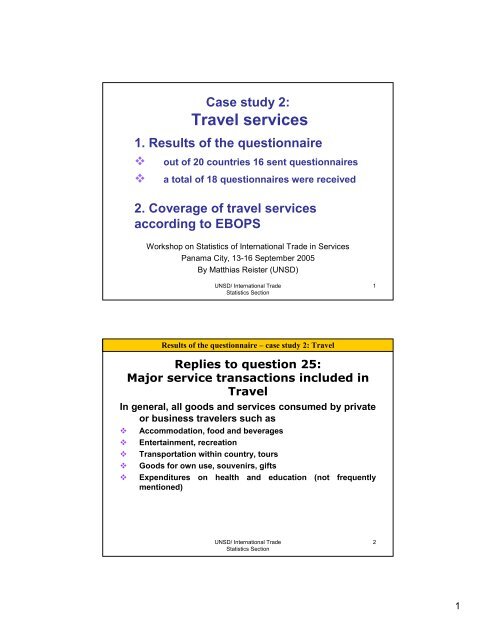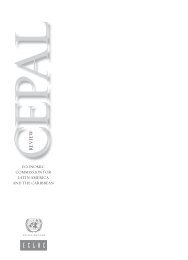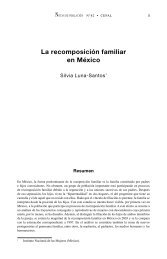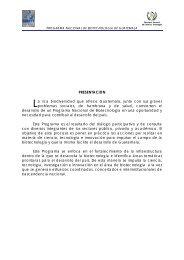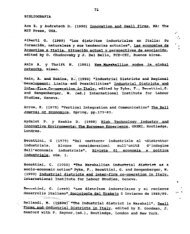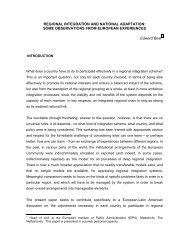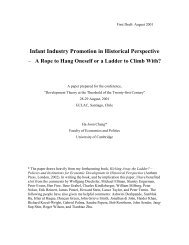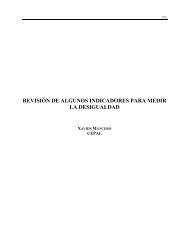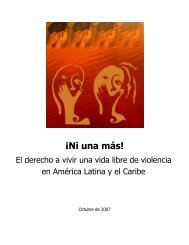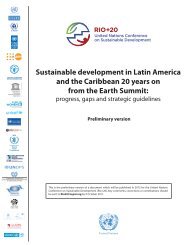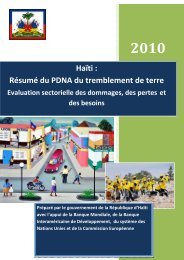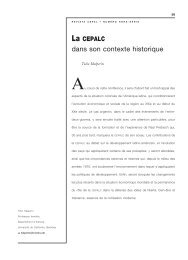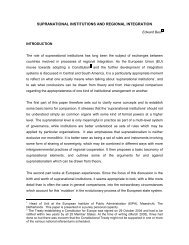Case Study 2: Travel Services
Case Study 2: Travel Services
Case Study 2: Travel Services
Create successful ePaper yourself
Turn your PDF publications into a flip-book with our unique Google optimized e-Paper software.
<strong>Case</strong> study 2:<br />
<strong>Travel</strong> services<br />
1. Results of the questionnaire<br />
� out of 20 countries 16 sent questionnaires<br />
� a total of 18 questionnaires were received<br />
2. Coverage of travel services<br />
according to EBOPS<br />
Workshop on Statistics of International Trade in <strong>Services</strong><br />
Panama City, 13-16 September 2005<br />
By Matthias Reister (UNSD)<br />
UNSD/ International Trade<br />
Statistics Section<br />
Results of the questionnaire – case study 2: <strong>Travel</strong><br />
Replies to question 25:<br />
Major service transactions included in<br />
<strong>Travel</strong><br />
In general, all goods and services consumed by private<br />
or business travelers such as<br />
� Accommodation, food and beverages<br />
� Entertainment, recreation<br />
� Transportation within country, tours<br />
� Goods for own use, souvenirs, gifts<br />
� Expenditures on health and education (not frequently<br />
mentioned)<br />
UNSD/ International Trade<br />
Statistics Section<br />
1<br />
2<br />
1
Results of the questionnaire – case study 2: <strong>Travel</strong><br />
Replies to question 26:<br />
Main data sources for <strong>Travel</strong><br />
� Expenditure surveys of travelers at port of entry/ departure (airports<br />
or other ports of entry)<br />
� Surveys of enterprises of the tourism industry such as hotels,<br />
airlines, tour operators etc.<br />
� Currency exchange records regarding the sale and purchase of<br />
currencies for travel purposes, credit card payments and<br />
�<br />
international payments of tour operators<br />
Administrative sources such as entry declarations of travelers or<br />
visa information, provided by government border control<br />
�<br />
institutions<br />
Surveys of universities and health centers<br />
Often surveys are conducted by or in cooperation with specialized<br />
institutions such as tourism ministry, board or institute.<br />
UNSD/ International Trade<br />
Statistics Section<br />
Results of the questionnaire – case study 2: <strong>Travel</strong><br />
Replies to question 27:<br />
How do you differentiate between business<br />
and personal travel ?<br />
� In many countries the survey of travelers includes a<br />
question regarding the purpose of travel<br />
� Also other data sources such as visa information contain this<br />
distinction<br />
Not all countries have information broken down into<br />
business and personal travel<br />
Replies to question 28:<br />
Do you breakdown travel expenditures into ”Expenditure<br />
on goods”, “Expenditure on accommodation and food and<br />
beverage serving services” and “All other travel<br />
expenditures”?<br />
� 9 countries out of 16 replied with YES<br />
UNSD/ International Trade<br />
Statistics Section<br />
3<br />
4<br />
2
Results of the questionnaire – case study 2: <strong>Travel</strong><br />
Replies to question 29:<br />
Do you treat as travelers non-residents staying for less than one<br />
year in your country?<br />
� Almost all countries follow this guideline<br />
� Comments/ exceptions<br />
- in practice not always easy to follow<br />
- one country makes an exception for persons which work in<br />
the country and change their center of economic interest.<br />
Replies to question 30:<br />
Do you treat as travelers non-resident students and non-resident<br />
medical patients receiving health care, however long they stay?<br />
� 8 countries out of 16 replied with YES<br />
UNSD/ International Trade<br />
Statistics Section<br />
Results of the questionnaire – case study 2: <strong>Travel</strong><br />
Replies to question 31:<br />
Do you exclude from travelers non-residents stationed on a<br />
military base or working at his/her embassy or consulate ?<br />
� Almost all countries follow this guideline<br />
Replies to question 32:<br />
Do you include (in business travel) expenditures of seasonal,<br />
border and other non-resident workers ?<br />
� 9 countries replied with YES and 5 countries with NO<br />
� Comments<br />
� Followed in principle but in practice difficulties<br />
UNSD/ International Trade<br />
Statistics Section<br />
5<br />
6<br />
3
<strong>Travel</strong> services – Coverage according to EBOPS<br />
<strong>Travel</strong> – Definition and coverage<br />
� All goods and services consumed by travelers<br />
abroad (Consumption abroad)<br />
� <strong>Travel</strong>er is an individual staying for less than one<br />
year (but students and patients are always<br />
considered to be travelers)<br />
� But excludes individuals stationed on a military base<br />
or employees of government agencies<br />
(expenditures are recorded under Government<br />
services, n.i.e.) or individuals undertaking a<br />
productive activity for a resident entity<br />
UNSD/ International Trade<br />
Statistics Section<br />
<strong>Travel</strong> services – Coverage according to EBOPS<br />
<strong>Travel</strong> – Classification and coverage<br />
� Business travel = acquisition of goods and services by business<br />
travelers, including seasonal, border and other workers<br />
1) Expenditures by seasonal and border workers;<br />
2) Other<br />
� Personal travel = covers goods and services acquired by travelers going<br />
abroad for purposes other than business – includes the participation in<br />
cultural and recreational activities as well as health and education related<br />
expenses<br />
1) Health-related expenditure;<br />
2) Education-related expenditure;<br />
3) Other<br />
� Excludes<br />
1.) International carriage of passengers<br />
2.) Passenger transportation services by carriers not resident<br />
(included in transportation)<br />
UNSD/ International Trade<br />
Statistics Section<br />
7<br />
8<br />
4
<strong>Travel</strong> services – Coverage according to EBOPS<br />
<strong>Travel</strong> – Three Memorandum items<br />
� Alternative breakdown into:<br />
1. Expenditure on goods<br />
2. Expenditure on accommodation and food<br />
and beverage serving services<br />
3. All other travel expenditures<br />
UNSD/ International Trade<br />
Statistics Section<br />
<strong>Travel</strong> services – Coverage according to EBOPS<br />
<strong>Travel</strong> in CPC and TSA<br />
� <strong>Travel</strong> is not identified in the Central Product<br />
Classification (CPC) and has no<br />
correspondence to the CPC (see Annex III of<br />
the Manual)<br />
� The Tourism Satellite Account (TSA) focuses<br />
on the concept of the ‘visitor’ which differs from<br />
the definition of ‘traveler’ in the Manual:<br />
- TSA regards students and medical patients in the same way as<br />
other visitors<br />
- Seasonal, border and other workers are not considered visitors<br />
- Refugees are always excluded<br />
UNSD/ International Trade<br />
Statistics Section<br />
9<br />
10<br />
5
<strong>Travel</strong> services – Coverage according to EBOPS<br />
Transportation (vs. <strong>Travel</strong>) – Coverage<br />
and definition<br />
Comprises 4 types of services provided by<br />
residents to non-residents:<br />
1. Carriage of passengers<br />
2. Movement of goods (freight)<br />
3. Rentals (charters) of carriers with crew<br />
4. Related supporting and auxiliary services<br />
(cargo handling, storage and warehousing, packing and<br />
repacking, maintenance and cleaning of transport equipment in<br />
ports / airports etc.)<br />
UNSD/ International Trade<br />
Statistics Section<br />
Transportation (vs. <strong>Travel</strong>) – includes/excludes<br />
Cruise fares<br />
<strong>Travel</strong> services – Coverage according to EBOPS<br />
Passenger <strong>Services</strong> include / exclude<br />
<strong>Services</strong> performed by non-residents within<br />
economy<br />
Fares that are part of package tours<br />
Charges for excess baggage<br />
Expenditures for food etc. of passengers on<br />
board<br />
Provided to non-residents by residents within<br />
economy<br />
Financial leases<br />
Time charters without crew<br />
UNSD/ International Trade<br />
Statistics Section<br />
<strong>Travel</strong><br />
<strong>Travel</strong><br />
11<br />
Goods transaction<br />
Operational<br />
leasing<br />
12<br />
6
Thank you<br />
UNSD/ International Trade<br />
Statistics Section<br />
13<br />
7


